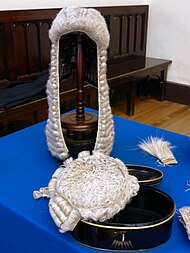barrister
Barrister (also Barrister-at-Law , from English bar = court ) is a lawyer in the legal system in England and Wales and other Commonwealth countries , which is shaped by the legal tradition of common law , who pleads before a court and produces procedural documents and other court-relevant documents designs. In contrast, there is the solicitor , who as a lawyer discusses with his client and advises them on legal matters, but does not appear before (higher) courts himself.
This distinction goes hand in hand with different vocational training courses and professional organizations of the two professional branches.
Functions
Depending on the legal system and country, the separation of functions between barrister and solicitor is differently strict. The functions in England , Wales , Scotland and Ireland are clearly separated . There is hardly any separation B. in Ontario or the Australian states of South Australia , Tasmania and Western Australia . The barrister is briefed on the case by the solicitor and then represents him in court. In Scotland the barrister of English law corresponds to the advocate .
English barristers are licensed by one of the four bar associations for barristers ( Inns of Court ) and must be members there. All of the bar associations are based in London near the Royal Courts of Justice . The four bar associations are:
- The Honorable Society of the Inner Temple ,
- The Honorable Society of the Middle Temple ,
- The Honorable Society of Gray's Inn and
- The Honorable Society of Lincoln's Inn .
The work as Crown Attorney ( Queens Counsel, QC or Kings Counsel, KC ) is reserved for only a few barristers.
Among other requirements, only those who have been barristers for at least ten years can become a judge at the High Court .
history
The development of the legal profession began in the early Middle Ages with a division into “attornies” and “pleaders” and in 1873 it was divided into “solicitors” and “barristers”, which still exists today. Originally it was necessary for the plaintiffs to apply for a "litigation lawyer" who should prepare the lawsuit in order to receive the royal writ , but also to employ a "specialist lawyer" who had a good command of "common law" and who could present it to the court .
Traditionally, barristers had the right to appear before everyone, including the highest courts in the country, as lawyers. Solicitors were only allowed to do this in lower instances . Barristers were not allowed to contact the client they represented in court directly, but only through the solicitor. These regulations have been relaxed somewhat in recent years.
The two-part system of the legal profession also existed in continental Europe , but was largely abolished by the beginning of the 19th century. The name for barrister was " Prokurator ". In some countries, parts of this dichotomy still exist in practice. In Poland , a distinction is made between the lawyer ( Adwokat ) and the legal advisor ( Radca prawny ), whereby only the latter can work in dependent employment. In the Netherlands , the Procureur was formally abolished in 2008, but a rule is still applied to proceedings before the High Council that only allows lawyers from The Hague district to litigate there. In Germany, there is a similar regulation for civil proceedings at the Federal Court of Justice : these can only be conducted by lawyers specially authorized there ( singular authorization ).
Web links
Individual evidence
- ↑ Kalliopi Kerameos: The Lawyer in England and Wales University of Cologne, 2000.
- ↑ Legal training in England and Wales Martin Henssler, Hanns Prütting: BRAO, 2nd ed., § 4.
- ↑ cf. Lawyers and other stakeholders in Ireland German Embassy Dublin, March 12, 2020.
- ↑ Bernhard Schmeilzl: When and why do you need a barrister? December 10, 2019.
- ↑ cf. Rawert: The dichotomy of the English legal profession, 1994, pp. 21–88.
- ↑ cf. Thomas Wegerich: Das English Anwaltsrecht, Regensburg 1992, pp. 6–43.
- ↑ Bernhard Schmeilzl: Solicitors, Barristers and Solicitor Advocates - who is actually allowed to do what? November 22, 2012.

